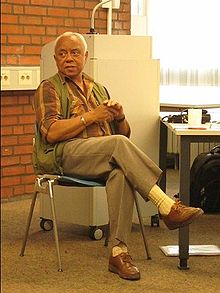- Neville Alexander
-
Neville Edward Alexander 
Neville Alexander at the World Conference of African Linguistics in Cologne, 18 September 2009Born 22 October 1936
Craddock, Eastern Cape, South AfricaNationality South African Education Holy Cross School, Craddock, South Africa Alma mater University of Cape Town BA & MA, PhD (University of Tübingen) Occupation Political Activist, Educationalist & Academic: Lecturer at various institutes and universities Known for Jailmate of Nelson Mandela and Linguapax winner Neville Edward Alexander (22 October 1936) is a proponent of a multilingual South Africa and a former revolutionary who spent ten years on Robben Island with Nelson Mandela.
Contents
Early life
Alexander was born in Cradock, Eastern Cape Province, South Africa to David James Alexander, a carpenter, and Dimbiti Bisho Alexander, a schoolteacher.[1] His maternal grandmother was an Ethiopian and was rescued from slavery by the British [2]
He was educated at Holy Rosary Convent, Cradock, and matriculated in 1952. He spent six years at the University of Cape Town obtaining a BA in German and History (1955), completing his Honours in German a year later and a MA in German, his thesis was on the Silesia Baroque drama of Andreas Gryphius and Daniel Caspar von Lohenstein. Having been awarded an Alexander von Humboldt Foundation fellowship place at the University of Tübingen[3] he gained his Phd in 1961 for a dissertation on style change in the dramatic work of Gerhart Hauptmann.[4]
The Apartheid years
By 1957 Alexander was already radicalised and a member of the Cape Peninsula Students' Union, an affiliate of The Non-European Unity Movement of South Africa.[5] He joined the African Peoples Democratic Union of Southern Africa (APDUSA) which was established in 1960. However he was ejected from APDUSA in 1961 and with Dulcie September, Kenneth Abrahams, Ottilie Abrahams, Fikile Bam, Andreas Shipinga, Marcus Solomon, Xenophon Pitt and Elizabeth van der Heyden, formed a study group of nine members in July 1962, known as the Yu Chi Chan Club (YCCC). Yu Chi Chan is the Chinese name for guerrilla warfare, which Mao Tse-Tung used. The YCCC disbanded in late 1962 to be replaced by the National Liberation Front (NLF) of which Alexander was a founder.
In July 1963 he, along with most members of the NLF, was arrested. In 1964, he was convicted of conspiracy to commit sabotage. From 1964–1974 he was imprisoned on Robben Island[6]
Post-Apartheid
After being released he has done much pioneering work in the field of language policy and planning in South Africa since the early 1980s via organisations such as the National Language Project, PRAESA, as well as the LANGTAG process. He has been influential in respect of language policy development with various government departments, including Education. His most recent work has focused on the tension between multilingualism and the hegemony of English in the public sphere. He is currently Director of PRAESA and a member of the Interim Governing Board of the African Academy of Languages.[7][8]
In 1981, he was appointed Director of the South African Committee for Higher Education (SACHED). He is currently a director of Project for the Study of Alternative Education in South Africa (PRAESA) at the University of Cape Town.[4]
In 1994 his Trotskyist Workers Organisation for Socialist Action contested the elections.[9]
Alexander was the recipient of the Linguapax Prize for 2008. The prize is awarded annually (since 2000) in recognition of contributions to linguistic diversity and multilingual education. The citation noted that he had devoted more than twenty years of his professional life to defend and preserve multilingualism in the post-apartheid South Africa and has become one of the major advocates of linguistic diversity.[10]
External links
References
- ^ "SA History - Neville Edward ALEXANDER". http://www.sahistory.org.za/pages/people/bios/alexander-n.htm. Retrieved 2009-02-21.
- ^ "How an Ethiopian slave became a South African teacher - Sandra Rowoldt Shell". BBC News. 2011-08-25. http://www.bbc.co.uk/news/world-africa-14357121. Retrieved 2011-08-24.
- ^ "Humbolt Fellow – Neville Edward Alexander". http://www.humboldt-foundation.de/pls/web/pub_hn_query.humboldtianer_details?p_externe_id=7000106455&p_lang=en&p_pattern=alexander. Retrieved 2009-02-21.
- ^ a b "Literature Network – Neville Alexander". http://www.litnet.co.za/cgi-bin/giga.cgi?cmd=cause_dir_leader&leader_id=2747&cause_id=1270. Retrieved 2009-02-21.
- ^ "SA History - Dulcie Evonne September". http://www.sahistory.org.za/pages/people/bios/september_d.htm. Retrieved 2009-02-21.
- ^ "PBS Interview about Mandella". http://www.pbs.org/wgbh/pages/frontline/shows/mandela/interviews/alexander.html. Retrieved 2009-02-21.
- ^ "PRAESA Biography". http://web.uct.ac.za/depts/praesa/st.html. Retrieved 2009-02-21.
- ^ "ACALAN History". http://www.acalan.org/eng/aboutacalan/historique.php. Retrieved 2009-02-21.
- ^ South Africa: what about the working class?
- ^ "Niamey Blog". http://niamey.blogspot.com/2008/03/linguapax-prize-2008-to-neville.html. Retrieved 2009-02-21.
Categories:- South African activists
- 1936 births
- University of Cape Town alumni
- University of Tübingen alumni
- Linguapax Prize winners
- Living people
- South African Trotskyists
Wikimedia Foundation. 2010.
